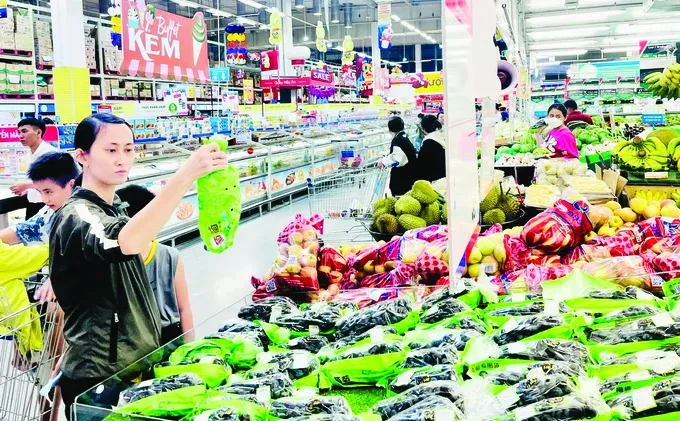
A survey of several inner-city districts in Hanoi on September 29 revealed elevated prices for leafy vegetables to reach VND12,000 - 15,000 (US$0.49 – 0.61) per bundle, up to VND7,000 ($0.28) higher than normal rates. Many wholesale markets experienced shortages of fruits and vegetables.
Several vendors attributed this price surge to annual seasonal fluctuations, characterized by a decline in the supply of tropical vegetables in September and October, coupled with the onset of the temperate vegetable season. Moreover, the recent heavy rainfall has hindered crop growth, further exacerbating the situation.
In addition to produce, pork prices have also experienced a recent upward trend, although they have since receded by VND3,000 ($0.12) per kilogram, remaining relatively high at VND68,000 - 70,000 ($2.76 – 2.85) per kilogram.
A similar situation can be found in other Northern localities, where the prices of leafy vegetables have more than doubled due to severe waterlogging, which has resulted in significant damage to vegetable farms. In Tuy Loc Commune of Yen Bai City (Yen Bai Province), for instance, the entire 100-hectare vegetable farm in the locality has been completely destroyed by the floods, and local farmers are now urgently working to restore production in order to mitigate the impact on the supply.
In contrast to the price instability in the North, HCMC is witnessing static meat and egg prices, at around VND100,000 ($4.06) per kilo and VND39,000 ($1.59) per dozen respectively. Leafy vegetables sold in retail markets have experienced a slight price increase of VND2,000 - 5,000 ($0.08 – 0.2) per kilo, depending on the variety. Vendors attribute these price increases to the rainy season, which makes leafy vegetables more susceptible to damage and difficult to preserve, consequently affecting both supply and prices.
Retail chains such as Saigon Co.op, MM Mega Market, Aeon Mall, and Central Retail (GO!, BigC) have reported adequate supplies of fruits, vegetables, and essential foodstuffs from southern regions to their supermarkets and stores in the northern region. After three weeks of heavy rain, floods, and storms, the demand for these commodities in the northern market has subsided compared to the previous peak week, prompting some systems to reduce their order volumes by 50 percent.
The supply of goods to wholesale markets has been relatively stable, and prices have remained steady. Leafy vegetables, however, tend to experience increased demand around the first and fifteenth days of the lunar month. Prolonged rainy weather can lead to damage and reduced quality of leafy vegetables, which can impact prices, albeit to a limited extent. Consumers can opt for alternative vegetables as a substitute.
Deputy Director Nguyen Nguyen Phuong of the HCMC Department of Industry and Trade stated that the department has been working diligently to ensure a stable supply of goods and has collaborated closely with modern retail enterprises, wholesale markets, and businesses in other localities to maintain both price stability and product quality.
Furthermore, the department has been implementing a year-long market stabilization program since the beginning of the year to prepare for the peak season at the end of the year and the 2025 Lunar New Year.
HCMC has, therefore, consistently maintained a stable supply and favorable prices in the market. The total volume of goods sold has remained steady, accounting for 21-32 percent of the market share in regular months and 24-41 percent of market demand during the Lunar New Year, demonstrating the city's ability to effectively regulate the market.
According to the Ministry of Industry and Trade and the Ministry of Finance, both have been closely monitoring the market and taking measures to stabilize prices since the end of the storm, ensuring that there are no goods shortages or unjustified price increases. The latter has instructed its departments to supervise price reporting and labeling. The Prime Minister has issued a directive to strictly punish hoarding and unjustified price increases following the storm.
Deputy Head Bui Nguyen Anh Tuan of the Domestic Market Department (under the Ministry of Industry and Trade) stated that the ministry is closely monitoring the market, regulating the flow of goods, and ensuring that there is sufficient supply to meet the needs of the population.
Recently, the Minister of Industry and Trade has urged businesses to facilitate the transportation of goods from unaffected areas to promptly meet the needs of people in disaster-stricken regions.
In Long An Province in particular, local authorities have reported no instances of price increases or hoarding. Chairman Nguyen Van Ut of the People's Committee of Long An Province stated that he has instructed the Market Management Department to intensify inspections and control of the local market, as well as to strictly penalize violations related to hoarding and overpriced labeling.
The provincial Department of Agriculture and Rural Development has been instructed to strengthen inspections of production facilities, businesses dealing in agricultural materials; agricultural, forestry, and fishery products; veterinary drugs; feed, chemicals, and biological products used in aquaculture. The department is required to promptly prevent and severely punish cases of hoarding, arbitrary price increases, and violations of regulations.
























